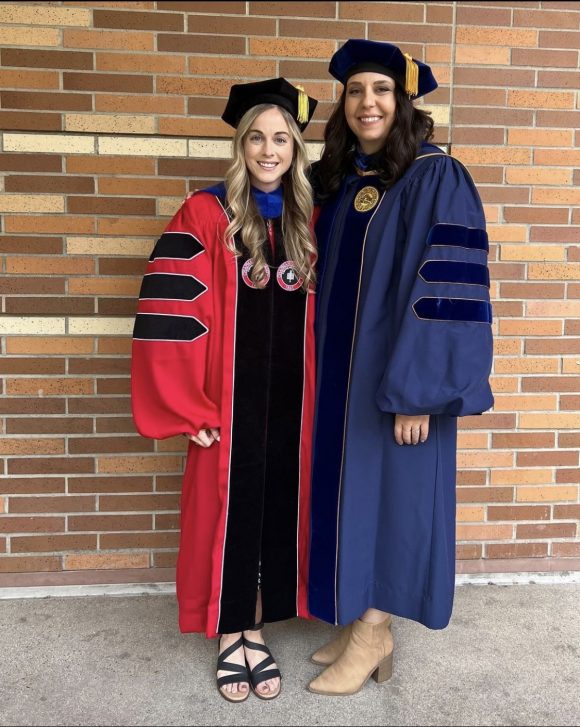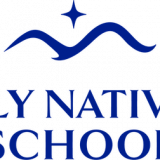Putting the Pieces of the Puzzle Together COM Faculty Interview Series featuring Dr. Hannah Ball
March 1, 2024
How well do you know your SoC professors? Dr. Hannah Ball has been teaching in the School of Communication since 2016 and is a highly renowned researcher, having been published in journals such as Communication Monographs, Health Communication, Journal of Social and Personal Relationships, Journal of American College Health, and Communication Quarterly, to name a few. Her research interests include health communication, persuasion, health campaigns, and family caregiving, and she teaches both undergraduate and graduate courses in health communication theory, message design, and research methods. In addition to her scholarly activity, Dr. Ball also serves in a leadership role for the National Communication Association’s Communication and Aging Division.

Dr. Hannah Ball and alumna Megan Norris ’18 (M.S. ’19) for winning a Top Paper award at the Western States Communication Association conference in 2020
How did your career begin?
The puzzle pieces of my career started coming together while I was an undergraduate student. I discovered my interest in research during an opportunity to collaborate with my undergrad advisor, my passion for teaching through experience as a tutor in the campus tutoring center, and the real-world impact of communication in a course where we developed and implemented a health campaign on campus. Although I never considered continuing on to graduate school until my undergrad advisor approached me about it, completing Master’s and PhD degrees so that I could pursue a career in academia – which combines these three puzzle pieces – made sense. Chapman was my first job after completing my PhD, and I am grateful every day to work on a vibrant campus with motivated students and accomplished colleagues who I can continue to learn from.
Did you always intend to work in academia?
I think a part of me always gravitated toward being a teacher – as a kid, I would make up homework assignments for my friends and grade them with red pen (shoutout to them for putting up with this, yikes). However, I originally declared a Communication major as a first-year undergrad to pursue a career in sports broadcasting… so, there was somewhat of a winding road to where I am now.
If not, where do you think your career would have taken you?
Definitely something numbers-related – I was a dual major in Communication Studies and Mathematics. When my undergrad advisor approached me about pursuing a graduate degree in Communication, the other career path I was exploring was becoming an Actuary. Lucky for me, I still get to play around with statistics (and even teach my students about them!) in my current profession.

Dr. Ball and her PhD advisee Tayah Wozniak ’22
What was the job-seeking process like for you?
The academic job market is not for the faint of heart – students, ask one of your professors about it some day and watch them become visibly stressed. It’s a grueling multiple-round interview process concluding for the top candidates with an all-day on-campus interview. I applied for jobs all across the country to better my chances (hence how I ended up 2,500 miles away from my hometown). Regardless of what job-seeking in your industry looks like, you have to mentally hang in there, remain confident in yourself and your skills, and work hard to create opportunities for yourself.
Did you have an internship during your educational career?
Instead of a traditional internship, I was paid to work on research with my undergraduate mentor (resulting in a publication!) – an experience that was invaluable when applying for graduate school. I love how the School of Communication at Chapman offers our students the opportunity to choose between completing a traditional internship and working on independent research with a faculty member to earn credit towards their degree, as either option helps students build marketable skills.
What advice would you give students who are currently job seeking?
“Be proactive! Leverage your personal connections, reach out to people about job openings on LinkedIn, apply to a lot of jobs including those in other industries that might be looking for your skillset, submit one more job application when you think you’ve done enough, send thank you emails after interviews. Seeking a job is a job itself that requires persistence (and a bit of patience), but the feeling that your hard work paid off when you land that first job will make it worth it.”
What advice would you give students struggling to write resumes or cover letters?
Before jumping into writing, research the position/company and brainstorm – literally, make a bulleted list – what you can communicate about your skillset to demonstrate that you are an excellent fit. Think strategically about what differentiates you from other students graduating from Chapman or with a similar degree who will be your competition on the job market (e.g., your combination of majors, internship experiences, special skills). Then, when writing, put your persuasion skills to the test! Not only identify those skills relevant to the position/company, but also concretely illustrate them by providing examples of work/internship/other experiences that demonstrate you do in fact have these skills AND mentioning how you will use these skills to contribute to this position/company.

